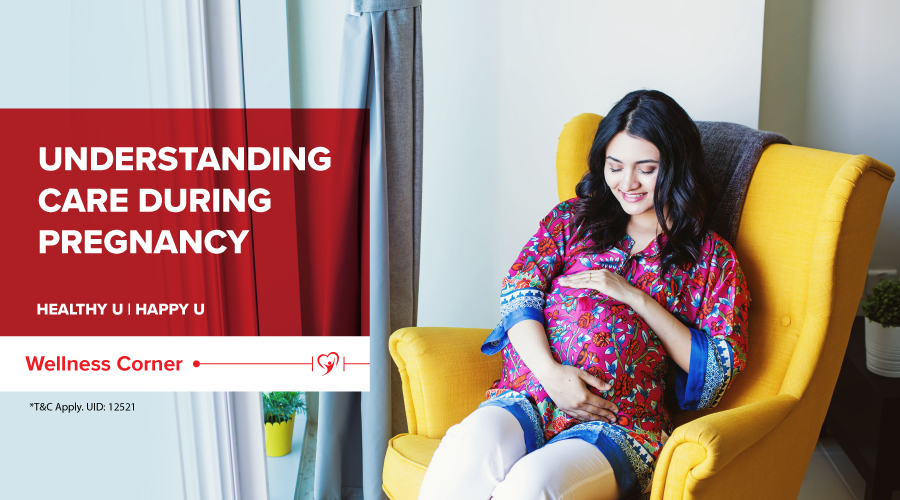

What is Pregnancy Care?
Overview
Getting good care before, during, and after pregnancy is very important as it is crucial to help your baby grow and develop, and keep you both healthy. Also, having a healthy pregnancy ensures a healthy delivery.
Pregnancy care consists of prenatal (before birth) and postpartum (after birth) healthcare for expectant mothers. It involves training, check-ups, treatments, consultations to secure healthy prenatal, labor and delivery and postpartum experience for both mother and child.
Pregnancy care is essential in safeguarding the overall health of mothers and their unborn children. Through a preventive health care system, women can learn essential healthy habits and behaviours during pregnancy, fully understand warning signs of pregnancy depression, post pregnancy (postpartum) depression, benefits of lactation etc . Trained health care personnel also provide women with social, emotional and psychological support at this critical time of their lives.
Understanding Pregnancy Care

Pregnancy care consists primarily of prenatal (before birth) and postpartum (after birth) healthcare of expectant mothers. Early and regular access to health care, both mental and physical, helps prevent complications in the later stages of pregnancy and childbirth. This kind of assistance can begin even before pregnancy with a visit to a healthcare provider.
Prenatal Care
Ideally, prenatal care begins at least three months prior to trying to conceive. This period, also known as preconception planning, prepares women for pregnancy, and is characterised by following some basic healthy habits, such as-
- Reducing alcohol consumption and quit smoking.
- Add daily folic acid supplements to diet.
- Doctor consultations regarding pre-existing medical conditions, choice of dietary supplements, and any other over-the-counter or prescription drugs.
- Avoid contact with toxic substances or chemicals either at home or work.
Prenatal care involves regular medical check-ups throughout pregnancy which helps to track baby’s development and detect and negate any future complications. It also allows the mother to open-up about their emotional & mental feelings which can prevent developing future possible depression symptoms.
The frequency of prenatal care visits depend on how far the pregnancy has preceded. It is also determined according to risk of complications involved.
A typical prenatal care schedule for age group 18-35 years with no underlying complications is:
- Every 4 or 6 weeks for the first 32 weeks.
- Every 2 or 3 weeks for the 32nd-37th weeks.
- Every week from the 37th week until delivery.
In case of high-risk pregnancy, the check-ups are more frequent and often require involvement of doctors with specific specialisation.
Initial visits involve regular checks to monitor the condition of both, mother and baby. It includes:
- Routine tests and screenings, such as a blood test to check for anaemia, HIV and blood type.
- Monitoring mother’s blood pressure.
- Measuring mother’s weight gain.
- Monitoring baby’s growth and heart rate.
- Talking about special diet and exercise.
Later visits include checking baby’s position and noting differences in the mother’s body as it prepares for birth. The doctor also discusses what to expect in each stage of pregnancy, prepares the mother for childbirth, and teaches basic skills to take care of the newborn.
Postpartum Care
Pregnancy care usually focuses on nine months of pregnancy and lesser attention is paid to postpartum care. Post-delivery care is essential for future well-being of the mother and her newborn baby.
Starting right after childbirth, postpartum period lasts six to eight weeks during which a new mother undergoes several physical, emotional and psychological changes. Postpartum care involves getting proper rest, nutrition, vaginal care, and mental counselling as while taking care of the newborn, a mother can often overlook symptoms of postpartum depression.
Adjusting to everyday life after the birth of a baby has its challenges, especially if you’re a new mother. Although it’s important to care for your baby, you also have to take care of yourself.
Here’s what you can do for an easier transition:
- Get enough rest - Get plenty of sleep as it helps to cope with tiredness and fatigue. This also helps in fast recovery and build-up of strength. As the sleep cycle changes depending on babies sleep pattern, one must ensure to sleep when their baby sleeps. This can help improve postpartum experiences.
- Healthy and nutritious diet- Getting proper nutrition post childbirth is crucial because of the changes your body goes through during pregnancy and labor. It helps to promote healing and provide enough nutrition to the baby, if breastfeeding. Avoid high-fat snacks and high cholesterol foods. Increase fluid intake and focus on eating low-fat foods with a balanced diet of protein, carbohydrates, and fruits and vegetables.
Vaginal Care
Vaginal care is an important part of postpartum care. New mothers often experience complications during delivery that can pose a threat to their general good health and mental wellbeing. During labor & post delivery, women may experience:
- Vaginal soreness, usually experienced due to tear during delivery
- Urination issues such as pain or even a frequent urge to urinate
- Discharge, often including small blood clots
- Contractions in first few days post delivery
One must abstain from sexual intercourse four to six weeks after delivery for proper vaginal healing. Schedule a checkup with your doctor about six weeks after delivery to discuss symptoms and receive proper treatment.
Conclusion
It’s important to stay as healthy as possible during pregnancy and during the postpartum period. Stay on top of all of your healthcare appointments and follow your doctor’s instructions for the health and safety of you and your baby.
Frequently Asked Questions
1. When should pregnancy care start?
Pregnancy care begins before you try to conceive a baby. You should visit the doctor for essential check ups and test for illnesses.
2. Is diet important during pregnancy care?
Yes, a healthy diet is an essential part of pregnancy care because you require additional nutrients than before when you are carrying a baby.
3. Can I exercise when I am pregnant?
If you are comfortable, you must keep up your daily physical activities. Exercise is of no harm to the baby.
4. Can I take supplements during pregnancy?
Expecting mothers should only use supplements after thoroughly consulting with their doctor.
Source: National Health Portal India | National Center for Biotechnology Information| Healthline| MedlinePlus
Get a right Health Insurance today & protect your savings from unexpected medical expenses.
While you take care to plan everything related to your pregnancy – diet, exercise, charting the birth plan – with utmost care and love, make sure that maternity insurance is also a part of your pregnancy checklist.
Check
out our medical insurance plans to know more.
Disclaimer: This blog provides general information and discussions about health and related subjects. The information and other content provided in this blog, website or in any linked materials are not intended and should not be considered, or used as a substitute for, medical advice, diagnosis or treatment. Kindly contact your Doctor before starting a new medicine or health regime.

/pregnancy-diet_s.jpg?sfvrsn=7a5ce0e5_2)
/pregnancy-care_s.jpg?sfvrsn=bc1596d4_2)
/postpartum-care_s.jpg?sfvrsn=c5fa68b_2)












 Health Insurance
Health Insurance  Travel Insurance
Travel Insurance  Car Insurance
Car Insurance  Cyber Insurance
Cyber Insurance  Critical Illness Insurance
Critical Illness Insurance
 Pet Insurance
Pet Insurance
 Bike/Two Wheeler Insurance
Bike/Two Wheeler Insurance  Home Insurance
Home Insurance  Third Party Vehicle Ins.
Third Party Vehicle Ins.  Tractor Insurance
Tractor Insurance  Goods Carrying Vehicle Ins.
Goods Carrying Vehicle Ins.  Passenger Carrying Vehicle Ins.
Passenger Carrying Vehicle Ins.  Compulsory Personal Accident Insurance
Compulsory Personal Accident Insurance  Travel Insurance
Travel Insurance  Rural
Rural 










